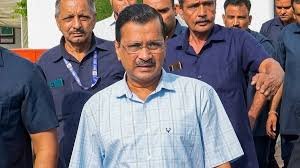Amidst mounting international scrutiny, the arrest of Delhi Chief Minister Arvind Kejriwal has sparked reactions from key global entities, including the United Nations (UN), echoing sentiments expressed by the United States and Germany. The UN spokesperson, Stephane Dujarric, articulated hopes for the protection of rights in India, particularly emphasizing the need for a conducive environment for fair and transparent elections as the country gears up for Lok Sabha polls.
The UN’s statement follows earlier remarks from the US and Germany, both advocating for due legal processes and the safeguarding of democratic principles in response to Kejriwal’s arrest. The US State Department spokesperson, Matthew Miller, reiterated the importance of fair legal proceedings, while Germany’s foreign office spokesperson, Sebastian Fischer, stressed the application of basic democratic standards.
United Nations 🇺🇳 Spokesperson on CM Arvind Kejriwal’s arrest
“What we very much hope that in India, everyone’s rights are protected… BOTH CIVIL & POLITICAL RIGHTS & everyone is able to vote to vote in the atmosphere FREE & FAIR” pic.twitter.com/scXDJooTQq
— Dr Ranjan (@AAPforNewIndia) March 29, 2024
India’s Ministry of External Affairs (MEA) swiftly responded to these international comments, asserting that the issues surrounding Kejriwal’s arrest and the freezing of Congress party’s bank accounts are internal matters. The MEA’s objections were reinforced by the summoning of diplomatic representatives from both the US and Germany, signaling India’s firm stance on maintaining sovereignty over its internal affairs.
Kejriwal’s arrest brings tensions
The diplomatic exchanges between India and its international counterparts underscore broader tensions surrounding the autonomy of democratic processes and judicial actions within the country. This latest episode adds to a series of confrontations between India and the US, notably regarding the Citizenship (Amendment) Act, and recurrent friction with Germany over judicial actions involving Indian opposition figures.
Kejriwal’s arrest, stemming from allegations of corruption and money laundering related to the Delhi liquor policy, has not only drawn attention from domestic political circles but has also become a focal point for international observers concerned about the integrity of India’s democratic institutions. As the legal proceedings unfold, the global spotlight on Kejriwal’s case serves as a litmus test for India’s commitment to upholding democratic norms and ensuring the protection of individual rights in the run-up to crucial elections.












